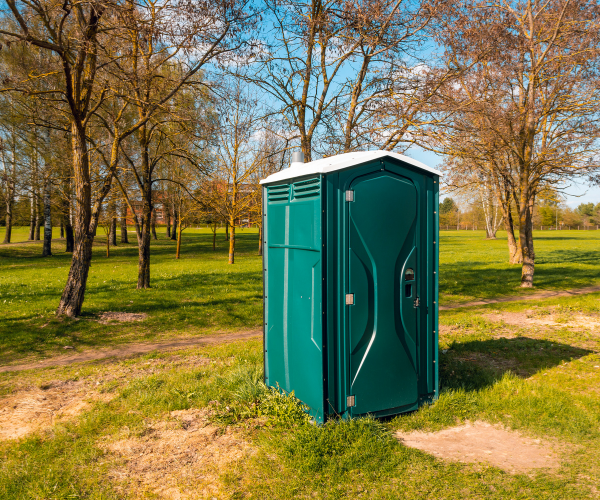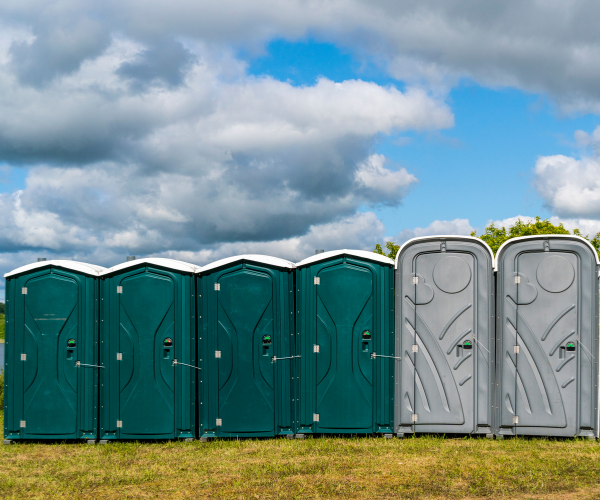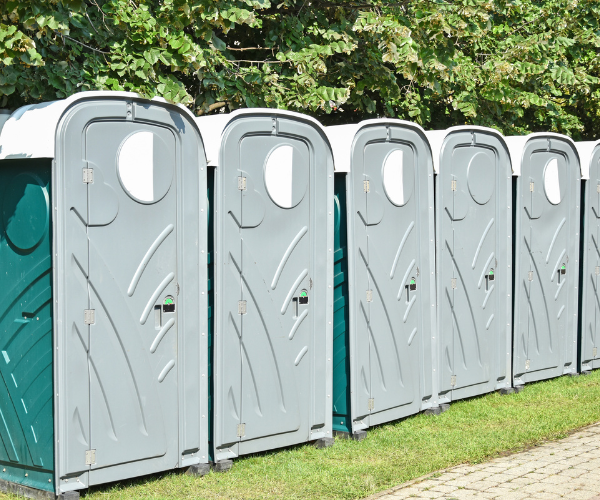Portable toilets offer a range of eco-friendly advantages that make them a sustainable choice for sanitation. One significant benefit is the reduced water usage compared to traditional restroom facilities. Portable toilets are designed to minimize water consumption by using efficient flushing systems and non-water based sanitation options. This reduction in water usage significantly contributes to conserving this precious resource, especially in areas prone to drought or water scarcity. By choosing portable toilets, event organizers and businesses can make a conscious effort toward environmental responsibility, supporting conservation efforts in their communities. Additionally, the waste disposal process for portable toilets is managed with minimal environmental impact. Waste is collected in secure containment units and transported to treatment facilities, where it is handled and processed under strict environmental regulations. This method not only prevents contamination of local water sources and landscapes but also allows for the safe treatment and disposal of waste, thus protecting ecosystems and public health. For events and construction sites, the ease of deploying and removing portable toilets reduces site disturbances and lessens the ecological footprint of temporary setups. Furthermore, many portable toilet units are constructed from recyclable materials, reducing the demand for new resources and decreasing the overall environmental impact associated with their manufacture and disposal. The design and material choice reflect a commitment to sustainability, supporting broader environmental goals through the responsible lifecycle of the products. In summary, portable toilets provide an eco-friendly solution that supports water conservation, ensures responsible waste management, and employs sustainable materials. These advantages demonstrate that opting for portable toilets extends beyond convenience, promoting a greener and more sustainable future.

Portable Toilet Rentals in Central, South Carolina
Call today for a free quote (864) 477-7907
Portable Toilet
Fast, Easy, & 100% Free To Get Started
Over 20 Years of Experience
With over 20 years of experience, LittleJohn Toilets has become a trusted name in Central. Our dedication to quality and community-driven service sets us apart as the leading provider of sanitation solutions.
Commitment to Excellence
We ensure the cleanest and most reliable portable toilet solutions, upholding our commitment to quality. Trust LittleJohn Toilets for exceptional service always.
Swift and Reliable Delivery
LittleJohn Toilets guarantees swift and efficient delivery across all portable toilet services. Rely on us for consistent, timely setup every time.
Reliable Portable Toilet Rentals in Central, South Carolina
Call for a Free Quote Today
(864) 477-7907
At LittleJohn Toilets, we proudly offer top-tier portable toilet services in Central, serving the local community and surrounding regions. As a locally owned and operated business, we ensure reliability and dependability for all your sanitation needs. Our portable toilet solutions are ideal for any occasion—construction sites, lively festivals, private weddings, or backyard parties. With years of experience, trust us to deliver clean, convenient, and high-quality units on time and at the necessary location. Choose us to experience exceptional service that prioritizes our customers every time.


Our standard porta john rental units are durable and reliable for any commercial build site, housing development, public works project, or remodel job.Features include dome lighting, grated floors, and an “In-Use” locking mechanism for privacy and comfort. Regularly maintained, inspected, and cleaned by FusionSite at your location.

Developed as an alternative to full ADA-compliant restrooms, the Liberty is a spacious, wheelchair-accessible unit that can also be promoted as a family-sized restroom. Includes a patented flat-floor system for easy wheelchair access and maneuverability.Handrails, paper holder, and rotary latch are designed for simple, intuitive end-user operation.

Portable hand washing stations are essential for keeping your work site sanitary and clean. Features hands-free foot pumps, liquid soap, and paper towels.Perfect for job sites without water hookups, these units can handle hundreds of washes between services.
We Proudly Serve
Standard Portable Toilets
Standard Portable Toilets by LittleJohn Toilets offer reliable sanitation solutions throughout South Carolina, tailored for any occasion.
High Rise Portable Toilets
Our High Rise Portable Toilets ensure quality sanitation solutions for elevated locations across Central, South Carolina.
Restroom Trailers
Restroom Trailers from LittleJohn Toilets provide upscale sanitation options for any Central event.
Roll off Dumpsters
LittleJohn Toilets' Roll off Dumpsters deliver efficient waste management solutions in Central.
Septic Tank Cleaning
Septic Tank Cleaning by LittleJohn Toilets ensures optimal sanitation in South Carolina.
Grease Trap Cleaning
LittleJohn Toilets' Grease Trap Cleaning services keep Central's food-related businesses running smoothly.
Fencing & Barricades
Fencing & Barricades from LittleJohn Toilets in South Carolina secure your site for safety and success.
Residential Storage
LittleJohn Toilets' Residential Storage services offer convenient solutions for Central, South Carolina residents.
Central Portable Toilet and Event Services
Getting a quote and scheduling delivery for your portable toilet needs has never been more convenient. At LittleJohn Toilets, we simplify the process with easy-to-use quote forms and streamlined booking. Our user-friendly website allows you to quickly fill out essential details, such as your name, contact information, and specific requirements. With these submitted, our responsive team is on hand to assist with any inquiries, making sure each client is matched with the perfect unit for their event or construction site. We prioritize efficiency, ensuring prompt delivery and setup across Central and its neighboring areas. From start to finish, the experience is designed to be effortless, leaving you with more time to focus on what truly matters—organizing your event or managing your project. Let us handle the sanitation needs, providing you with clean, reliable units in a timely manner for ultimate peace of mind.

Central, known for its outdoor attractions like the Central Railroad Festival, requires a portable sanitation solution that complements its charm and community spirit. Our services integrate seamlessly into local settings, enhancing events by providing reliable, hygienic portable toilets. They offer guests a clean, comfortable experience at nature-centric outings and lively community gatherings. Our portable toilets go beyond convenience; they embody Central's hospitality. Whether it’s a local festival or a wedding set against the scenic Central-Clemson Recreation Center, we provide solutions that meet every requirement with unwavering reliability. Trust us to deliver a service that perfectly aligns with Central's essence, allowing your guests to enjoy the occasion without worrying about restroom logistics. Our focus on quality, cleanliness, and community solidifies our status as Central's premier choice for portable sanitation. LittleJohn Toilets is committed to partnering with you and delivering excellence at every event.
At LittleJohn Toilets, we have established ourselves as the best choice for portable sanitation in the Central area. Our unwavering commitment to quality and service sets us apart. With an intimate understanding of local needs and preferences, we tailor our offerings to enhance every community event and gathering. Beyond our clean and reliable facilities, our focus on exceptional customer service ensures every interaction is as seamless as possible. We take pride in aligning our offerings with Central's vibrant community events, providing you with solutions that reflect the area's charm and welcoming spirit.Experience the difference our expertise and dedication bring. Choose LittleJohn Toilets for portable sanitation that blends reliability, local appeal, and top-tier service.
Speed and reliability define our portable toilet services. At LittleJohn Toilets, we recognize the need for prompt solutions, especially when events or projects adhere to tight schedules. Our logistics team ensures your order arrives swiftly, fully set up, and ready for use. We prioritize not only efficiency but also dependability, focusing on maintaining your reputation and ensuring guest satisfaction. Whether supporting a construction project or enhancing a festive event, our fast, reliable service offers peace of mind. Count on us for the rapid delivery and setup of clean, well-maintained portable toilets throughout Central, making LittleJohn Toilets the reliable choice for your requirements.
Discover our Portable Toilet Solutions in Central
Renting a portable toilet in Central has never been easier, thanks to our streamlined process designed for your convenience. On our website, you'll find 'Get A Quote' buttons prominently displayed across several pages, making it simple to start your rental journey with just one click. Begin by filling out our easy-access online forms, positioned strategically both at the top and bottom of each page. Here, you'll provide key details like your first name, last name, phone number, and email address, allowing us to customize our services to fit your needs. After submitting the form, our proactive team will reach out to discuss any additional questions or specific requirements. We pride ourselves on our responsiveness, ensuring you receive a detailed quote that includes every necessary component, along with delivery and setup instructions. This meticulous attention to detail sets LittleJohn Toilets apart in the rental market, guaranteeing that customers feel supported and understood from their initial inquiry to the successful completion of their event or project. Our efficient process not only saves you time but also ensures a seamless rental experience. If you have special requests or unique setups, inform our team, and we'll ensure your rental meets your expectations perfectly.
Understanding the logistics of portable toilet deliveries is key to ensuring your event runs smoothly. Here at LittleJohn Toilets, we strive to provide swift and dependable service. Typically, once an order is confirmed, you can expect your portable toilets to arrive within 24 to 48 hours. This quick turnaround ensures that last-minute plans or sudden changes in event schedules are always accommodated without stress. Our well-coordinated delivery system is tailored to meet the demands of high-volume orders, such as those required for large festivals, or single-unit requests for private gatherings. While the standard timeline suits most, we also offer expedited services for clients needing immediate setups, ensuring no event goes underserved. Each delivery is precisely scheduled, and our team remains in constant communication to update clients on progress and expected delivery times. This transparency helps manage logistics effectively, integrating seamlessly into overall event planning. Additionally, our well-maintained fleet of delivery vehicles ensures reliability, reducing any risk of delay. LittleJohn Toilets is committed to upholding punctual service standards, making sure each unit arrives ready for use, with hassle-free setup to swiftly meet your sanitation needs.
Yes, LittleJohn Toilets is fully equipped to service any type of event or construction service, adapting to a wide array of requirements. From large-scale festivals and sport events to more intimate settings like weddings and family reunions, we cater to all. Our range of services extends to include luxury restroom trailers, standard porta potties, roll-off dumpsters, fencing, barricades, and even ADA-compliant units to ensure accessibility for all guests. Our experienced team works closely with event organizers and construction managers to tailor our offerings to each unique situation, identifying the most effective sanitation solutions. By diversifying our inventory to include portable sinks and hand sanitizer stations, we extend our focus to comprehensive hygiene solutions that complement any occasion. Choosing us guarantees a commitment to quality and flexibility, with a service scope that adapts to your specific needs. Whether it's the precision involved in coordinated deliveries or the ongoing support throughout your event, LittleJohn Toilets is constantly evolving to exceed client expectations. We take pride in delivering excellence, ensuring every project, large or small, receives the care and attention it deserves.

